- Home
- Steve Rasnic Tem
The Man on the Ceiling Page 6
The Man on the Ceiling Read online
Page 6
But the older I got and the more I wrote, the less I cared about what they thought of me. And I started watching their faces as they told their tales.
I’ve watched Melanie in just this way, as she’s told her stories, thousands of times.
At times it has seemed as if my eyes have grown progressively wider over the years. I do stare, sometimes, I know, to the discomfort of others. I imagine that if I just look closely enough I will see the faces behind the faces of those speaking the words. I will see the characters themselves, struggling for recognition.
I want to see where the thresholds are. I want to know in which direction the doors swing. I want to know what lies outside the windows. I want to avoid the sharp corners where two or sometimes three walls meet. I want to figure out that convoluted floor plan before the days become too short and the nights too sweet.
I want to know where all my children live.
Christopher, our eldest child, is homeless.
I don’t mean that he sleeps on the street, under a bridge, in a doorway redolent with piss and semen—though for all I know he has. It wouldn’t surprise me to learn that he has gone hungry, panhandled, looted garbage cans, fought someone for a piece of bread or an inch of vodka in the bottom of a broken bottle, but that’s not what I mean, either.
I mean he is without a home in the world. Without a place. Despite our fierce efforts and love that learned to be tough in every sense of the word, Chris does not seem to have a sense of his place in this life.
He also doesn’t seem to have a sense of his own story. His pain, rather than providing any sort of energy or inspiration, has fossilized and been buried. Years of addictions have layered over it, turning it into a trick rather than a metaphor. Chris doesn’t imagine; he lies.
Ten years old when he came to us, Chris almost let himself imagine us as his family. Right away he called us Dad and Mom. When the judge pronounced the adoption final, he squeezed Melanie’s hand under the table.
But he’s never quite been brave enough to take that imaginative leap. If you listed the things that happened to him before he became our son, they wouldn’t seem as horrible as what happened to some of our other children who have much less trouble finding their way in the world. Most likely he wasn’t sexually abused, for instance, or nearly killed. But, like the rest of them, he was abandoned again and again by adults he’d been persuaded to trust, had every reason to trust, and it was too much for him. He can’t imagine a family. He can’t imagine a place. He can’t tell his story without lying. He puts all his energy into making a place for himself, and he’s an alien everywhere.
No matter how hard I listen to my son Chris, no matter how closely I watch his face as he tells story after story that is not his, I have no idea who he is or where he lives.
Both Melanie and I grew up in green-and-gray rural places. I was raised in a small town in the Appalachian mountains of southwest Virginia, Melanie on the outskirts of an only slightly larger northwestern Pennsylvania town (also in Appalachia, a later and somewhat startling geographic discovery). Our roots are there.
Together we’ve always lived in north Denver, the second-oldest suburb of this brown-and-blue city, on a street that can get busy at rush hour and when there’s a Broncos game but otherwise doesn’t make much commotion. We’ve put down roots here, too.
I was never very good with either my hands or feet. It always seemed to me they’d just been stuck on as an afterthought during my making. Dreams didn’t translate through sports, or music, dancing, carpentry, plumbing. I was the bookish kid, more at home in the pages of a fantasy than in the room in the town on the planet.
But the need to make persisted. Books and puppets and games and, finally, pictures came to house my imaginings, making new spaces in the world.
In the countless crannies of the big old house we’d bought, our daughter Veronica couldn’t find the exact space to fit the person she was becoming. She needed to be away from us and still close, separate and connected, still at home but at the very top of the house getting ready to climb out and fly away. None of us could have articulated much of that at the time, but the attic seemed to be the place.
There was evidence that the attic had been finished in the past, but it wasn’t finished now. Nails, with fragments of black wood attached, dotted the roof beams. Remnants of antique electrical cable dangled between rafters. Off in the shadows, wedged against unused chimneys and jammed tight under the eaves, were a dozen or so sets of tarnished bed springs, a rusted sink or two, a few lost toys. In summer the attic smelled oddly sweet and comforting, like cookies baking.
I wondered why the rooms once up here would have been torn out. The house was full of mysteries like that—the back of a storage closet walled up to create a completely enclosed space, arcane electrical boxes, a stockpile of doors that fit no doorways we could find, sink fittings inside a staircase landing. Evidence of places created by those who had lived in our house, imagined and re-imagined to suit the tastes of the time and the individual.
There was no indication that the builders of any of these spaces had been professionals. I began to consider: would I do any worse than they had?
I did what I always do when I encounter something I don’t understand very well: I read up on it. Mounds of books accumulated, on carpentry and electrical work and the joys and pitfalls of remodeling. I became an ardent fan of This Old House. Slowly, awkwardly, I began the process of creating for my daughter a space in the world, or at least a space in the house, with built-in drawers for the new outfits I would never approve of, bookcases to hold her soap opera magazines and true crime books I wasn’t sure she should be reading, a built-in desk, even a built-in bed. And a secret compartment under the desk for hiding away from—or for entertaining, making peace with—any serial killers or white-gowned knife-wielding ladies who might drop in for tea and cookies.
“She’s going to love this room,” Melanie told me, quick to find inspiration in any household event. And she made sure our daughter knew how much work I was putting into making things as right for her as an amateur could.
I don’t know if Veronica ever loved it. The sloping walls met at eccentric angles, and the wallpaper constantly defeated me. But I think she got the point. Her dad believed she had a right to her own place in the world, and would do whatever he could to give her one. Then it was up to her to make it work.
Since then I’ve made many spaces in our house: erected walls and reshaped ceilings, wired dark corners for light, put up bookshelves everywhere, teased all sorts of reading nooks out of random emptiness or random clutter (I love reading nooks, whether anyone ever sits and reads in them or not). I’ve changed the way air moves through our home, altered the way shadows lie. Though I still make no claims for myself as architect or craftsman, I’ve proceeded as if I knew what I was doing.
I’ve read that the aesthetic challenge of building something out West is competing with all that sky. Everything you lay against it seems unnecessary, if not pointless. Most buildings here keep a pretty low profile, seemingly more at ease in relation to each other than against the blue.
When a big one finally does go up, new buildings appear to take that pioneer as their backdrop, and eventually the architects seem to ignore the sky. At times it seems a race to see how quickly they can fill in the skyline and the last clear view of the mountains.
Among my personal favorites are the ones that go straight up and then add pilasters and broken pediments across the top two stories. It’s interesting to imagine temples rising above the waters after some cataclysmic Colorado flood.
I suppose a major function of shelter is that it hides you. When I was a kid I found nothing more comforting than the inside of a cardboard box. If I really had to have a window I could cut the one I wanted, to see only what I wanted. The thing about the outside world is that somehow, eventually, it eats you.
Chris, my son, has found no shelter, no place to hide. Everything he’s tried has only exposed him more.<
br />
I concede that everything eventually gets eaten. But I also believe that the spaces we make are still there, even after the house falls down. The room I made for my daughter could very well last as long as the Pyramids. Not the physical walls or the things built into them or the peach-blossom wallpaper, but the space. That imagined place.
I have not been able to make a space for Chris.
As I was finishing up the reconfiguration of the attic space, I’d gleefully inform Melanie on at least a weekly basis: “This is the last 2x4 I will ever buy.” “This is the last sheet of drywall I’ll ever carry.” “This is the last bookcase this house can hold.” Our house was finished and full.
Ah, but there are always repairs, responding to the wear and tear of occupying the place we’ve made. Maintenance. Stewardship. The shower’s dripping. A pane in the bay window is cracked. The porch light’s out again.
Creating a place is exhilarating, like falling in love. Maintaining it is pretty much endless.
I know it isn’t practical, it doesn’t light the room or plug the draft, but these days I spend most of my time with stories: reading them, making them up, listening to other people tell them.
At a block party a few years after we’d settled in here, a lifelong neighborhood resident told me a story about our house. Once upon a time, a husband and wife lived here, not very friendly, kept to themselves, and another person (male or female; child of the older couple or cousin, uncle, sibling; old or young—details unavailable) who was never seen, who lived in an attic room painted completely—including the windows—black. The neighbor knew some of this because he’d seen the family bring someone in and out under cover of night. And he’d seen the black room after the family had moved out. But like good storytellers everywhere, he didn’t speculate much on what it all meant.
Thinking about the bits of black-painted wallboard I’d had to remove before beginning my daughter’s room, I was glad for several reasons that I hadn’t heard about this before. I don’t know if I could have put my daughter’s room into that same space once occupied by the black room. I would always wonder what it might do to her dreams.
Sometimes I wake up in rooms that haven’t been built yet, or will never be built. Sometimes I wake up alone and understand that from here on out the faces I see in every window will be unrecognizable to me. But the world’s colors are the same colors they have always been. And the spaces between the colors create a universal rhythm and language that all of us can understand.
So, as terrified as I am, I know this one huge house we all live in has always been pretty much the same. We just arrange it differently according to our personal tastes and the things that have happened to us.
But that’s not much comfort when you wake up in the middle of the night and there’s no one to tell you where the light switch is. When you wake up in what seems to be some stranger’s house but is in fact your own personal and private dwelling, far removed from the house you’ve shared with your family for years. You can’t find your way to the window. You can’t even find your way to the bathroom. What is this place and how did I get here?
Many years ago, in our backyard, near the green apple tree, a few feet from the black iron fence, a new room began to take shape. At first no more than a vague geometric notion, it grew and spread until it evolved into an invisible house overlapping our house, sharing a few features with it: a daughter’s bedroom, a corner of the basement, the south wall of the garage. Most of the walls in the invisible house, however, didn’t match up with any walls at this particular Denver address; most of the invisible doors and windows led to spaces and vistas none of us had ever known.
At times I was acutely aware that this was happening, could see these other doors, smell these other walls. I think maybe the rest of the family knew it, too, although they probably would have described it differently. How could they not have known? After all, this was the place where we were all living.
Over time I realized that the room I saw when I opened my son Joe’s door was not the same room he escaped to every afternoon for sleep and dream. And my daughter’s room had far more complications in its wallpaper than I could ever see. Each of us lived in a different house, and sometimes those houses weren’t even in the same neighborhood.
I don’t think Chris has a house. I wish I’d known how to make him one, or how to teach him to make one for himself.
The other day a cab driver told me you have to position yourself to be available for miracles. There was only the most minimal context for this remark; he must have been driving around town with it on the tip of his tongue. It burst out of him as we rounded a corner and arrived at our destination, so there was no chance to find out more, but I bet there’s a story in that, and probably someday I’ll write it. You have to position yourself to be available for stories, too, and every encounter with every story is a miracle.
I wish I could help Chris find his story. I would position myself to be available for it. I would listen with all my heart.
Every night I climb the three flights of stairs from my basement office suite (a rather grandiose term for that rabbit warren stuffed with books, videos, computers, puppets) to the attic rooms it took me years to complete. What awaits me there is about as mundane as you can get: a stationary bike.
“It’ll make you feel better,” they tell me, but that isn’t really my reason. “You’ll look better,” about which I no longer care. “You’ll live longer,” seems closer to my own motivation; I have children and grandchildren now, and I’d like to live long enough to hear as many of their stories as possible.
My favorite thing, the best thing I know to do now that my body is older and fatter and gravity has become an invisible enemy I must fight just to move through the day, is to shut off all these attic lights I so carefully placed and wired, so that it’s pitch black in the crown of our home, but even that isn’t dark enough so I close my eyes as I continue to pedal, wheels slicing the air below me, invisible rooms rearranging themselves around me, and I rise through the roof of our house, settling on the roof line, exposed to the night and everything in the spaces beyond, while I continue to pedal.
One night I saw Chris there. When I first caught sight of the darkly coruscating shape, I thought it was a bird, bound as surely as the rest of us by gravity and need no matter how much we wingless creatures want to make it a symbol of freedom. A night bird, limned in moonlight, migrating somewhere or coming to roost in our house, a bird of prey or just a traveler through the dark. Sound of feathers.
Then I saw that its form was human, not avian, and even though I don’t believe in such things I thought: ghost, angel.
I thought: Lost child.
I thought: Chris. My son.
He settled on another of the many roof lines of our house, out of my reach but close enough that it seemed plausible he’d intended us to meet up here, in this place as much in the high air as on the uppermost limit of the house.
“Chris?”
“Dad.”
Exposed like a decoy, I was uneasy, even afraid, and glad we were encountering each other away from the rest of the family, who presumably lay below us safe and unaware. I don’t think Chris would intentionally hurt us. But I can’t be sure he would intentionally not hurt us, either. It’s a terrible thing to be even a little afraid of your own child.
He said, “I have something to tell you.”
I wanted to say, “Don’t tell me That.” I wanted to say, “I don’t want to hear it.” I wanted to say, “I’ve already heard enough of your stories, and I never know what’s true.”
Instead, I found myself assuming the listening posture I’d perfected over all those years, from which I could watch his face as he talked. The lower lip that still pouts when he doesn’t get his way. The high cheekbones that give striking contour to his naturally round face and accentuate its gauntness when he’s been shooting heroin for a while. The teardrop tattoo below his left eye.
He was crouching gargoyle-like
on the steeply-pitched roof, and I was afraid for him. It’s also a terrible thing to be afraid for your child, and it’s part of the parental condition. For some of my kids I’m afraid they’ll get hurt in love or won’t find fulfilling careers or will let their talents go to waste. My fears for this one are considerably more primal: that he’ll destroy himself and leave a trail of harm where he’s passed through the world.
I could have just descended into the house again and gone to bed, leaving him out there to do whatever he was going to do, to tell whatever tales he came up with this time. Instead, I said, “I’m listening, son.” And I was, with all my heart.
He said, “You know that time I ran away from that detention center when I was, what, fifteen? That whole summer? I hid out in this house. You didn’t know that, did you?”
Actually, after he’d been captured elsewhere, we had found evidence of his squatting. In the dusty, cobwebby space around the furnace, which we grandiosely call the furnace “room” because it has four walls and a door that closes (and because we like the idea of “rooms”), Chris had set up a place for himself, with a folding chair, a twelve-inch black-and-white TV that hardly could be said to work, a sleeping bag and pillow, upturned boxes for tables. All these furnishings he’d purloined from closets and shelves elsewhere in the house, and we’d never missed them. Dishes, too, and food—we found orange peels, a half-empty box of cornflakes. We also found potato chip bags, empty beer bottles, and cigarette butts, which he had to have brought in from outside.
While both of us are more than a little territorial, I’m usually touchier than Melanie about violations of the personal space defined by our house. But she’d been especially creeped out by the thought of Chris hiding in our basement—apparently for some time, judging by the den he’d made for himself—without our ever knowing he was there. “How could we not know?” she kept demanding, as if I could explain it to her, as if somehow there shouldn’t be secrets about children and intimate places.
“I heard you,” Chris told me now. He was dangling his feet over the edge of the roof like a little kid.

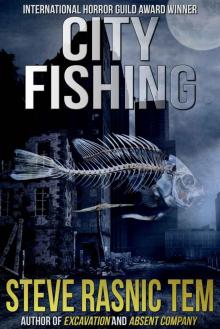 City Fishing
City Fishing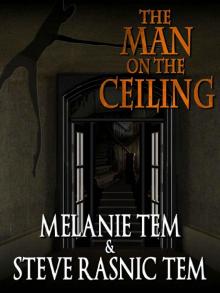 The Man on the Ceiling
The Man on the Ceiling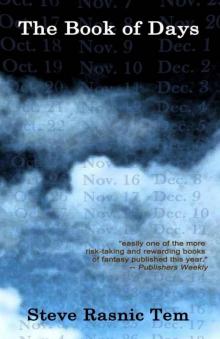 The Book of Days
The Book of Days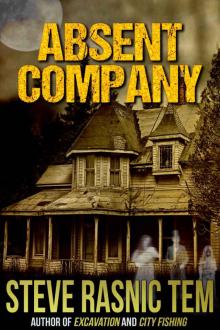 Absent Company
Absent Company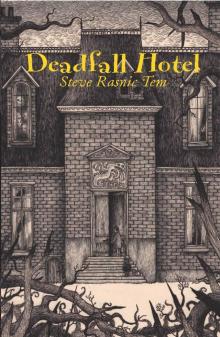 Deadfall Hotel
Deadfall Hotel Celestial Inventories
Celestial Inventories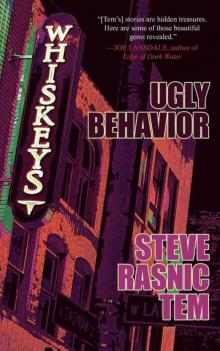 Ugly Behavior
Ugly Behavior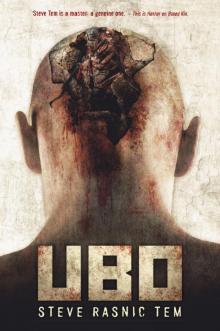 Ubo
Ubo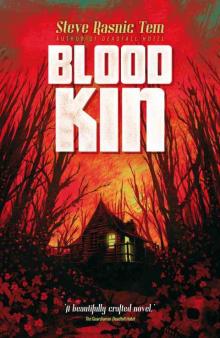 Blood Kin
Blood Kin